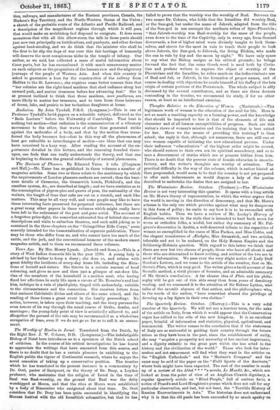The Worship of Baalim in Israel. Translated from the Dutch,
by the Right Rev. J. W. Colons*, D.D. (Longman.)—The indefatigable Bishop of Natal here introduces us to a specimen of the Dutch school of criticism. In the course of his critical investigations he has learnt to appreciate the writings that have emanated from this source, and there is no doubt that he has a certain pleasure in exhibiting to the English public, the vigour of Continental research, where he enjoys the novel sensation of taking up a conservative position. The treatise which he has translated in the present instance is a commentary by Dr. Oort, pastor of Santpoort, on the theory of Dr. Dozy, a Leyden professor, who maintains that the religion of Israel in the time of Saul was Baal-worship, on the ground that Baal was the• deity worshipped at Mecca, and that the rites at Mecca were established by a body of Simeonites who emigrated about that time. Dr. Oort considers that Dr. Dozy has been quite successful in identifying the Meccan festival with the old Israelitish solemnities, but that he has failed to prove that the worship was the worship of Baal. Between the two comes Dr. Colenso, who holds that the Israelites did worship Baal, or the Sun-god, but under the name of Jahveh, adapted from the title of the Sun-god in use amongst the northern tribes of Syro-Phoenicia; "that Jahveh-worship was Baal-worship for the mass of the people, even down to the time of the Captivity, only in every age, from Samuel downwards, a few of higher mind were divinely taught to look them- selves, and strove for the most in vain to teach their people to look above Jahveh, the Sun-god, to Jehovah, the living Elohim, who made the sun to rule by day and the moon by night." We have only space to say what the Bishop assigns as his critical grounds ; he brings forward the fact that the same Greek word is used both by Chris- tian and profane writers to express the object of worship of the Phoenicians and the Israelites, he relies mach on the indiscriminate use of Baal and Jab, or Jahvoh, in the formation of proper names, and of course in dealing with objections he avails himself of his thetary of the late origin of certain portions of the Pentateuch. The whole subject is ably discussed by the several contributors, and as there are three doctors contending in the treatise, we recommend its study, if for no other reason, at least as an intellectual exercise.






























 Previous page
Previous page